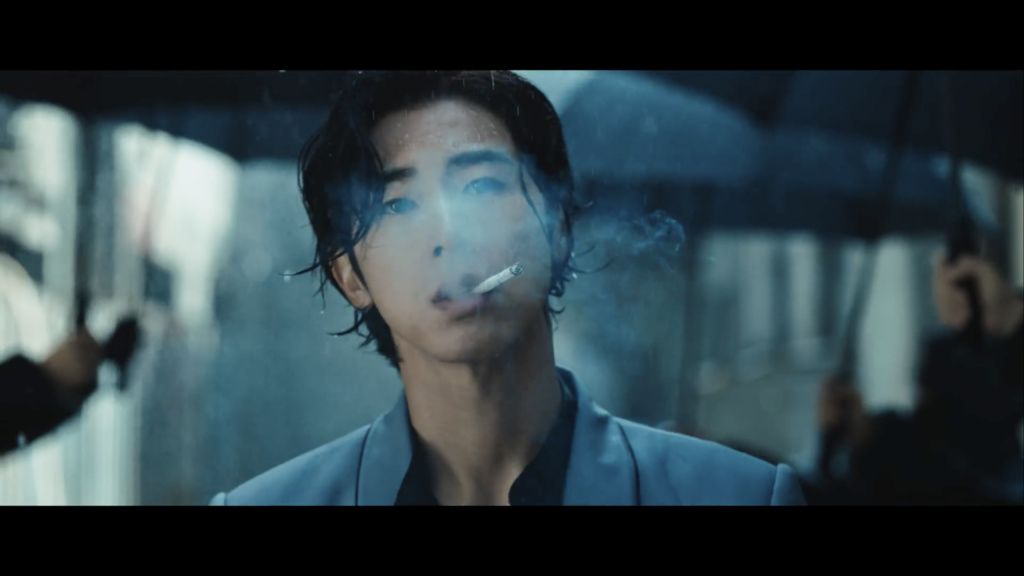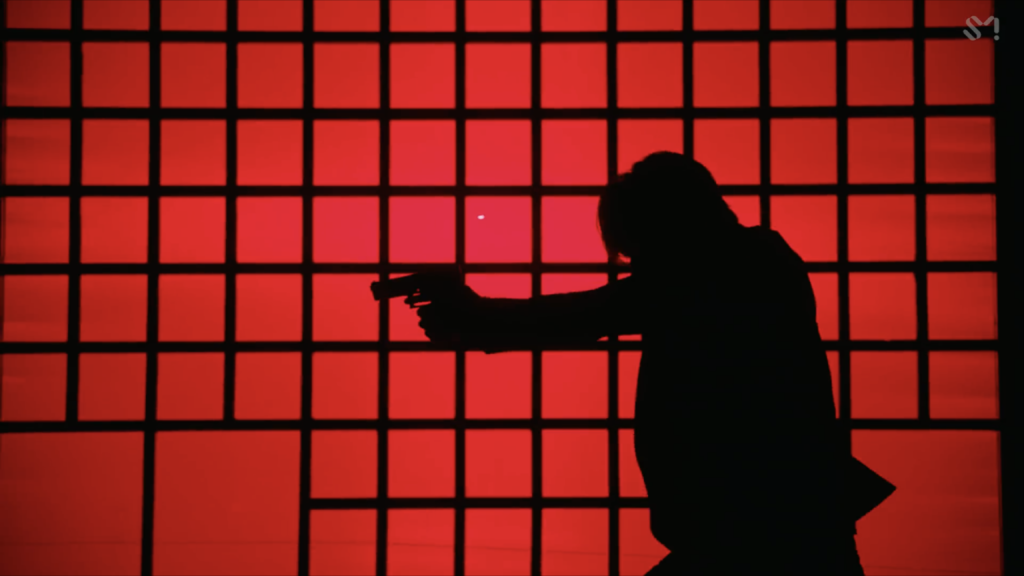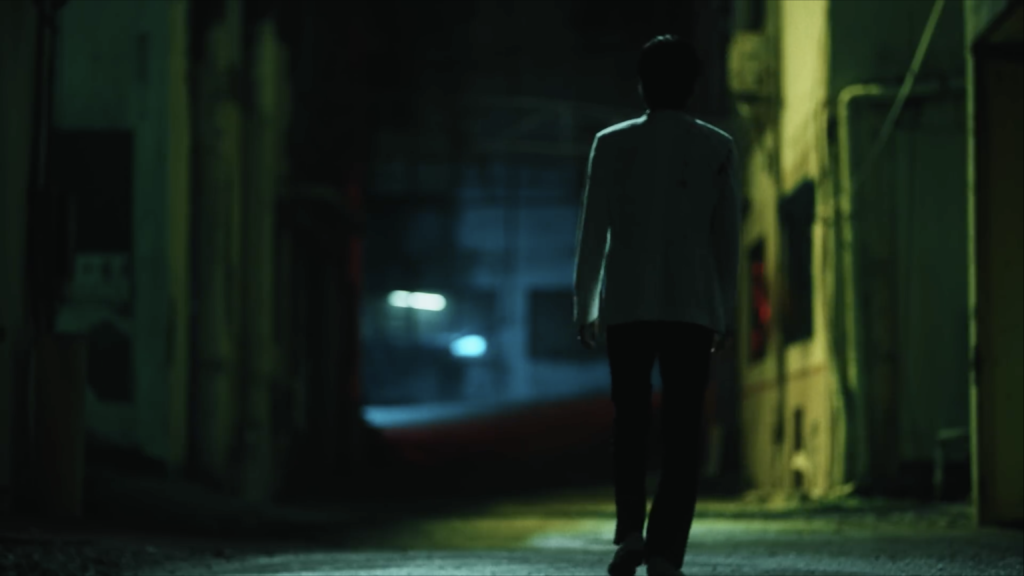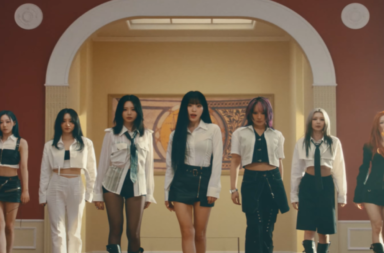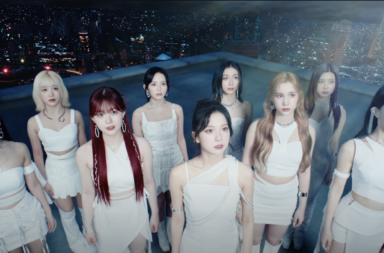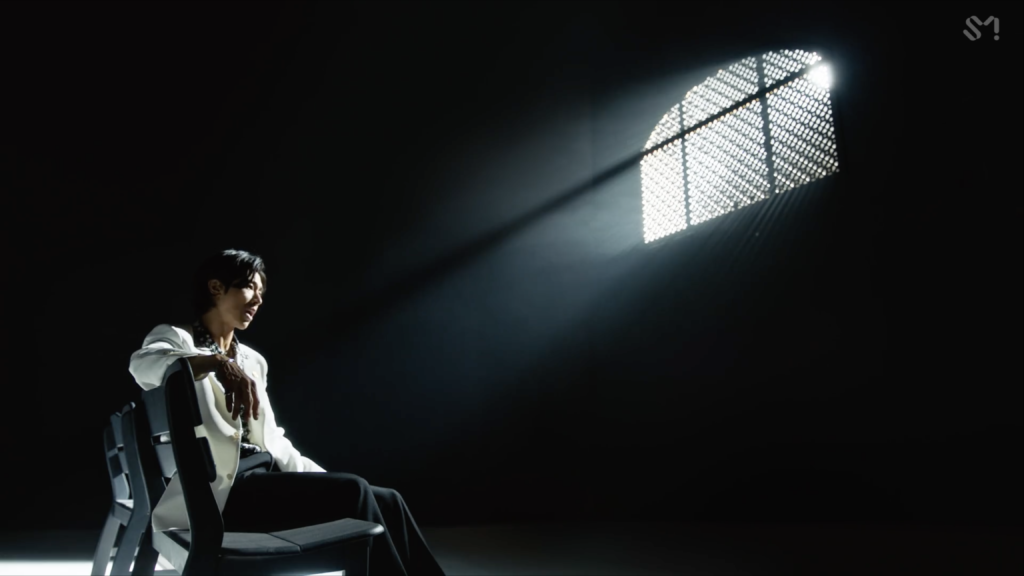
If you’ve been a K-pop fan for long enough, you’d know that there used to be a time where violence in MVs was not a big deal. Knives, guns, and blood: they were all tools used to bring out the grittiness of a song or a group’s image. T-ara‘s “Day By Day“, B.A.P.‘s “One Shot“, and even TVXQ‘s “Before U Go” might pop up in your mind. Looking at it that way, perhaps, you could say that TVXQ’s Yunho‘s 2021 release, “Thank U”, is not too different.
Except, that wouldn’t be right.
There are two main traits that set “Thank U” apart; first, violence is not the focus of the MV. It is not an MV that’s trying to be edgy by making the audience gasp at what should be censored (in the K-pop industry). It is not trying to go viral simply by introducing blood and gore. No, tastefully, the fighting and the killing are reluctantly done on behalf of the protagonist, Yunho.
Second, there is no hiding the reality of bloodshed and destruction. Where most MVs would make violence palatable — muting the colour of blood, overlaying loud music over fight scenes, or panning away from the gore — “Thank U” does the opposite.
By itself, the sound design draws your attention even to the most minuscule details of the tension that comes with conflict. The searing sound of a cigarette lighting up, gang members running on wet ground to line up, Yunho’s measured steps as he walks to Boss Wang (Hwang Jungmin), the grim sound of Jaenam (Lee Junghyun) stabbing Yunho multiple times, and the thudding of Yunho’s body to the ground — all of these work in tandem to draw the audience in, and that’s before any music even creeps in.
The same sound design is later repeated in a climactic round of Russian roulette between Yunho and Boss Wang, which pushes watchers to the edge of their seats.
With “Thank U”, the devil is in the details. The MV’s direction draws heavily from various noir films, both Asian and Western. A prominent one is Yukio Mishima‘s Patriotism. Another is Mishima: A Life in Four Chapters, and this wasn’t left unnoticed by fans or its director, Paul Schrader. It is also difficult to ignore the hints of Quentin Tarantino‘s Kill Bill, Park Chan-wook‘s Oldboy, Kon Ichikawa‘s An Actor’s Revenge, or the likeness to Kim Jee-won‘s A Bittersweet Life.
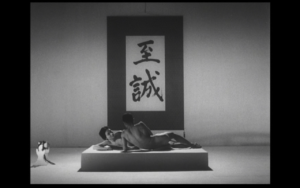
‘Patriotism’ – Yukio Mishima (1966) 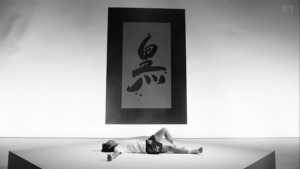
‘Thank U’ – U-Know Yunho (2021) 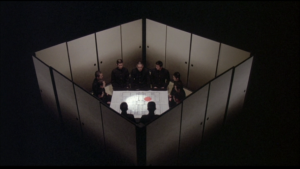
‘Mishima: A Life in Four Chapters’ – Paul Schrader (1985) 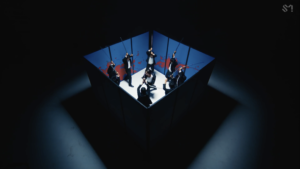
‘Thank U’ – U-Know Yunho (2021)
The lingering influence of classic noir films is not the main selling point. Rather, it is how these techniques were used to construct a storyline that was an acute but subtle metaphor of Yunho’s life thus far.
To sum it up, “Thank U” tells the story of boxer/commando-turned-mafia member Yunho who is approaching Boss Wang with the possible intention of forming an alliance (or being undercover to bring him down), only for Boss Wang’s top henchman (Jaenam) and other gang members to murder him. It’s not a convoluted plot. When paired with the lyrics, though, the MV presents itself as a deeper analogy of the struggles Yunho has been through in his 18-year career.
When it hurts, it just,
it makes you even more lonely.
Expressions that have become familiar,
doubting the meaning in good intentions,
why do I have to be like that?
Why can’t it all work out so that it’s all good?
What Yunho has been through is common knowledge. Though the veteran idol is now seen as a textbook idol, the Ideal Idol, the reputation did not come without years of invasion and criticism. From having some of the worst sasaengs and anti-fans known to K-pop’s history, to getting flack for smoking as a grown adult, to being criticised as a leader, rapper, singer, and actor — there is little that Yunho (and TVXQ) has not been hated for.
It is no surprise, then, that his career has come at the cost of distrustful journalists, and friends that he may not trust. “Thank U” uses its lyrics and MV to depict this issue.
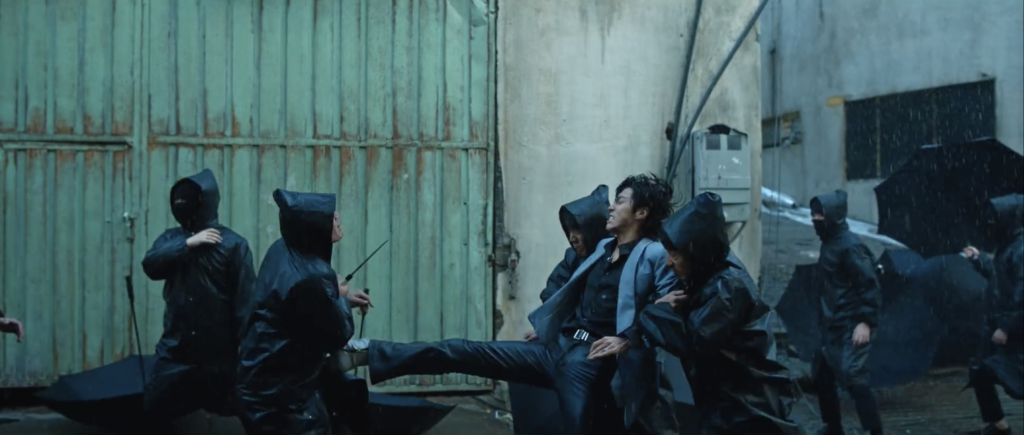
At the start of the MV, Yunho walks towards the camera, surrounded by gang members he can supposedly trust before he is brutally betrayed by all of them. The smoke of his cigarette blows directly at the camera, which disrupts the viewers’ perspective of a clear image of Yunho, and creates a sense of vagueness. At the end of the MV, Yunho is once again seen walking alone, but this time away from the camera, and into a background that is clearly defined.
Though alone in both instances, Yunho is truly lonely in the first; he is surrounded by people, yet he knows not who he can depend on. At least, in the end, even if he walks alone, he walks with that knowledge, instead of thinking he can rely on those around him.
It’s also interesting to note how the colours change throughout the MV. “Thank U” starts with a setting that is drenched in blue. Depicting melancholy, calmness, and contemplation, Yunho doesn’t know what he’s in for. The rain emphasises contemplation; Hong Kong director Wong Kar-wai often uses the rain to show his characters reflecting. Wong also employs the sharing of umbrellas to depict bonding between characters. Similarly, Yunho is shown relying on gang members as they shelter him with multiple umbrellas.
The red bleeds into the MV when Yunho is lying on the ground after getting stabbed and the video brings in increasing amounts of red towards the climax of the video. Representing fury, anger, and revenge, red is a prominent colour bringing an indirect tone of vengefulness to “Thank U”. It’s curious that Yunho is mostly attacked with knives — perhaps indicative of the sharpness of hate comments and bitter betrayal — but he fights back with guns, which are quicker and instantaneous. A quick end to the hatred he receives.
Later, as the MV comes down from its high, the colour palette changes back to be predominantly blue. Back into the mood of calmness and contemplation. Yunho is also seen walking into a city lighted in blue. Has he reached closure? Has he accepted that he is more than the hate comments he gets? Or does it mean that he has accepted that the only one he can rely on is himself? Surely, it would be less lonely than sharing your pain with people who would use the pain for their own means.
It’s impossible not to see the artist U-Know Yunho be reflected in “Thank U”‘s gangster-Yunho. Even in the field of underground criminality, Yunho abides by the laws present in lawlessness. When he escapes from the hospital, he doesn’t attack Jaenam until Jaenam attacks him first. Before he heads off to kill Boss Wang, he’s seen appearing in a confessional: a sign that even as a prominent gang leader, his conscience bears down on him.
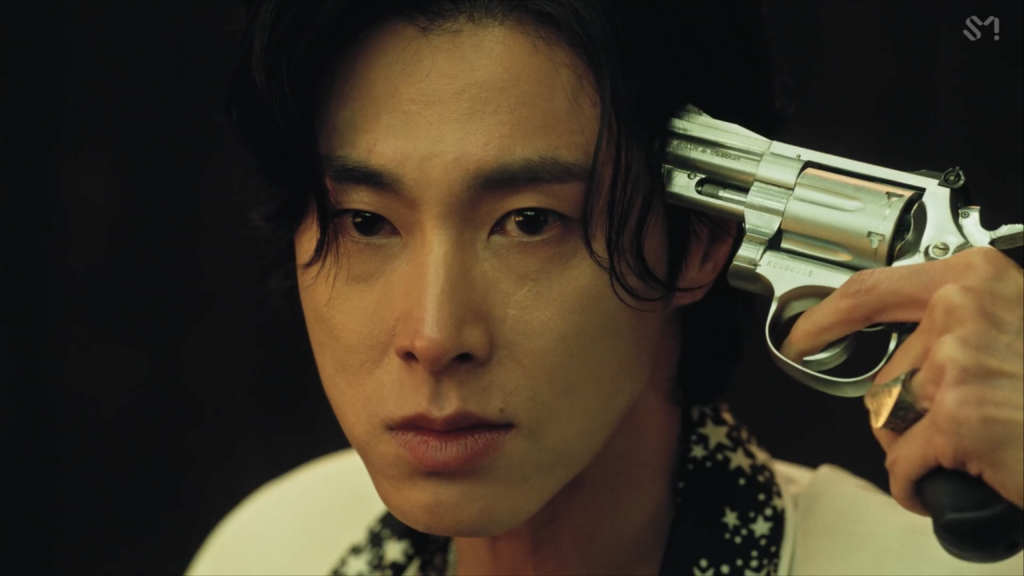
Instead of simply offing Boss Wang upon meeting him, he lowers his guns respects the boss’ rules to engage in Russian roulette — and even fires the gun against his temple twice in a row. In the MV, Yunho never once attacks first, and never performs dirty tricks to win. He is betrayed, he trains to protect himself, and respectfully (well, as respectful as a mafia boss could be) faces his opponents.
The plot is indicative of how no matter how malicious the comments against him or TVXQ have gotten, the idol U-Know Yunho has continued living his life in the manner he considers best and morally correct. At the end of the day, people will come for you regardless. With “Thank U”, Yunho claims how the only thing you can do is (quite literally) shoot the haters down, and move on with your life.
The lyrics assert this:
Thank you for diss.
Thank you for like.
Thank you for me.
Thank you for dislike me.
It’s easy to take the last line as a matter of grammatical incorrectness, but “dislike me” could also mean the combination of formerly mentioned “diss”, “like”, and “me”. That is, it could be interpreted as “thank you for the hate / thank you for the love / thank you for who I am / thank you for everything”.
But even without Yunho’s backstory, “Thank U” makes for a compelling music video. There are so many classical elements that are done right in this Tarantino-Wong-esque MV that there is little to fault. As a textbook idol, he and his team fulfilled the textbook definition of a narrative plot: exposition, rising action, climax, falling action, and resolution.
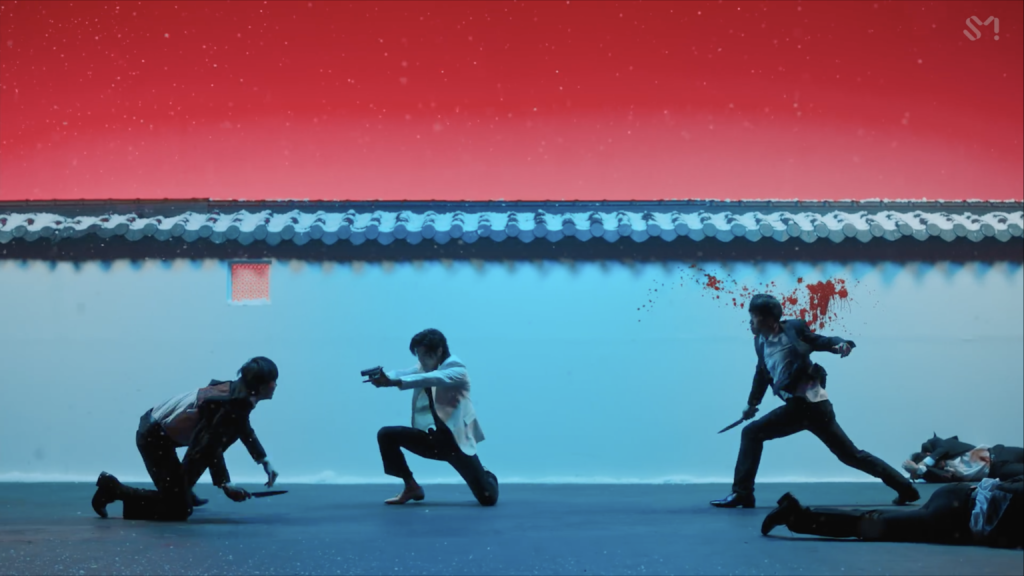
Within just eight minutes, main director Kim Hyunsoo (and six other directors) put together an MV that was quintessentially flawless. There are no jarring cuts to the choreography; rather, the MV is presented akin to a musical, where the choreography is used to transition from scene to scene.
There are also the finer details that tie the MV together. The lack of dialogue not only amplifies the tension, but also directs the audience’s attention to the acting, the colour blocking, the sound design, and the camera direction. In fact, the MV does such a good job of being an MV that you’d watch the video again even if you didn’t like the song.
Yoo Young-jin‘s print is all over the song, and while it’s been a long time TVXQ have dabbled in SMP, this seems to be close to it. The instrumental of this song is rich; it features the velvety textures of organs and trumpets, subtle acapella vocal layering, thumping percussions, and muted brass that elevates the magnificence of the song. Pair it with Yunho’s rap-rhyme, Yoo’s background vocals, and Yunho’s vocals, and you have a classic SM-style groove. Yunho’s particular style of rapping works extremely well too since it comes off as a monologue on behalf of the protagonist.
“Thank U”, as a track, makes you think of a typical TVXQ song, but one that’s tuned to highlight Yunho’s flair and personality. Even with multiple elements coming into play, they all work together to present an addictive rhythm. The instrumental dramatically slows down and fades out during the bridge, and yet the groove keeps going.
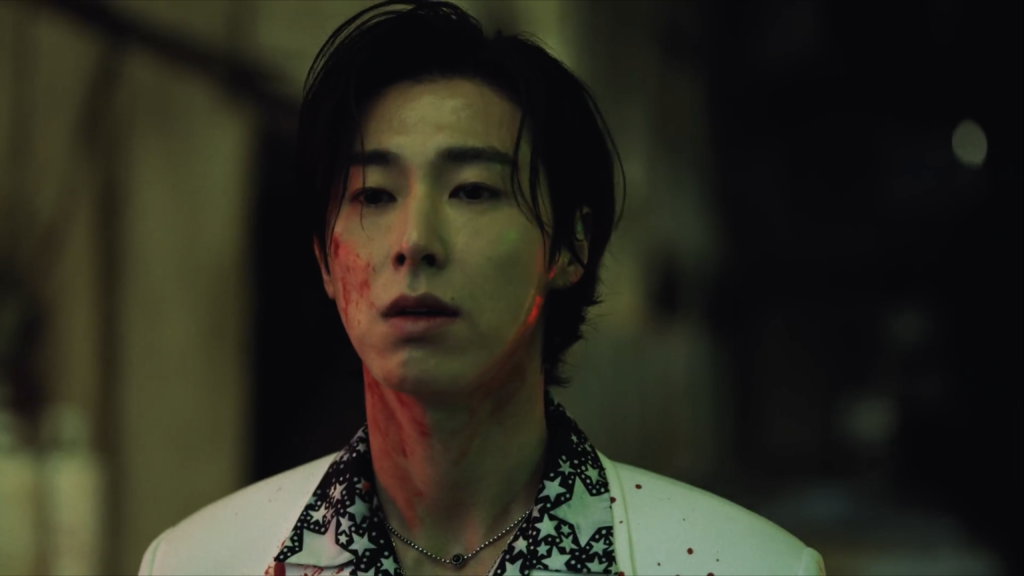
Be that as it may, as with any SMP track, “Thank U” might not be up everyone’s alley. However, the best part about its MV is that that does not matter. As watchers will realised, the track is secondary to the video that is presented. It’s been a long time since I’ve seen a MV do its job so well. The “Thank U” MV is one that draws in the audience regardless of the song, and just perhaps has you repeating it enough times for the song to grow on you. It’s a model MV that hits just the right boxes, so no, Yunho, thank you.
(YouTube [1] [2]. Facebook. Lyrics via: SM Entertainment. Images via: SM Entertainment.)
